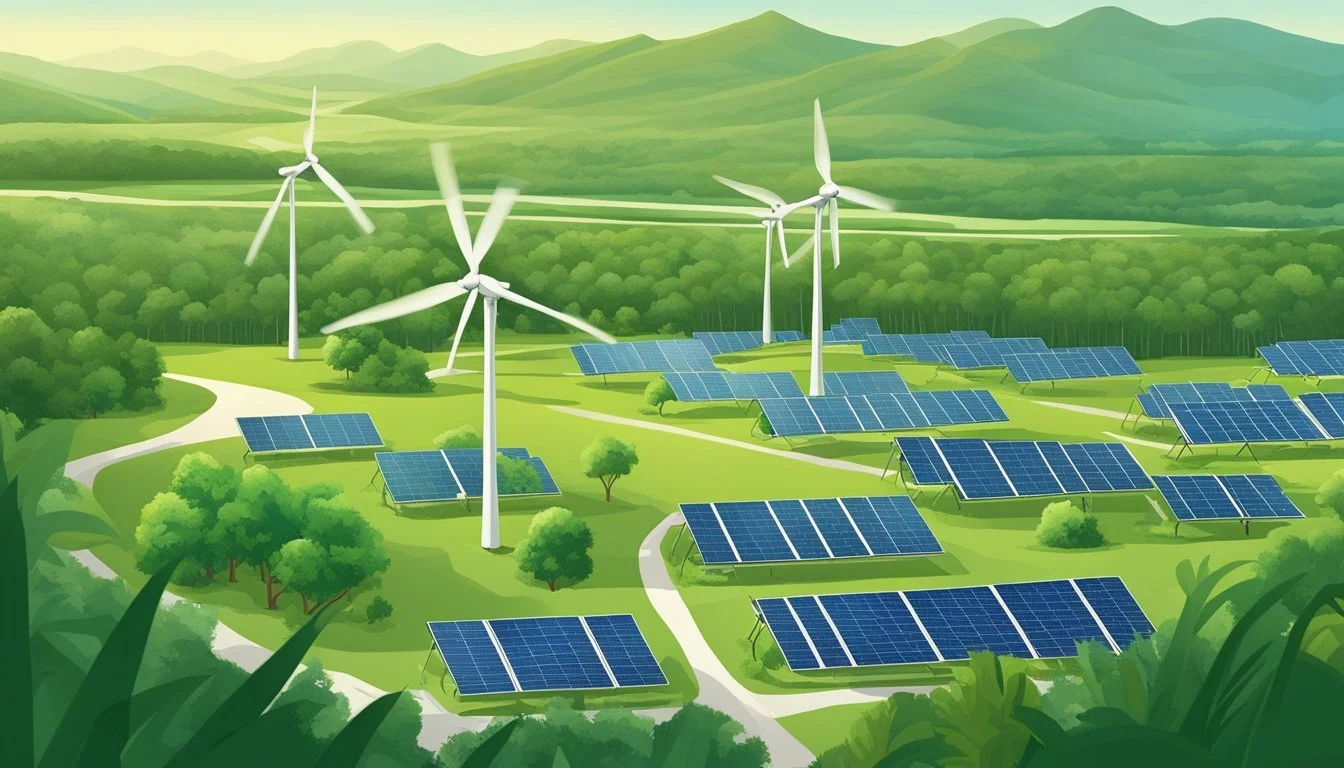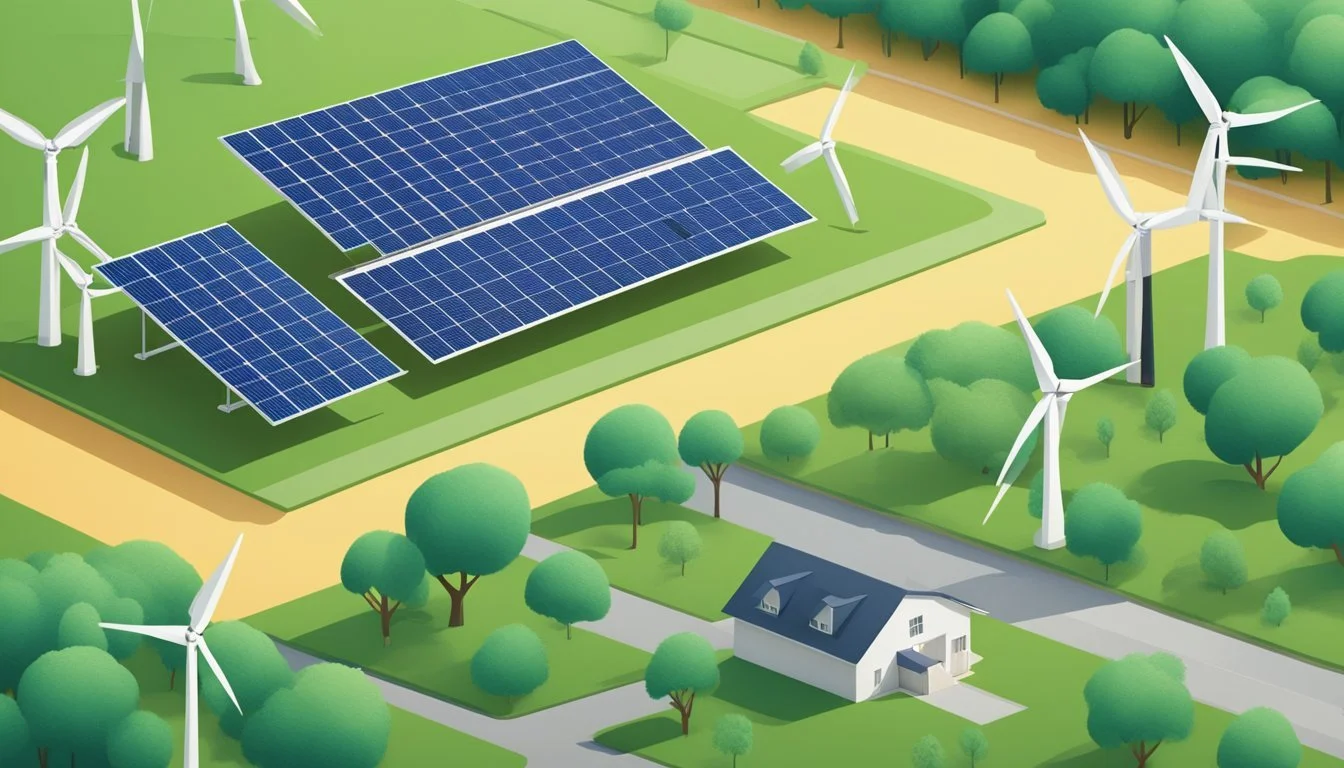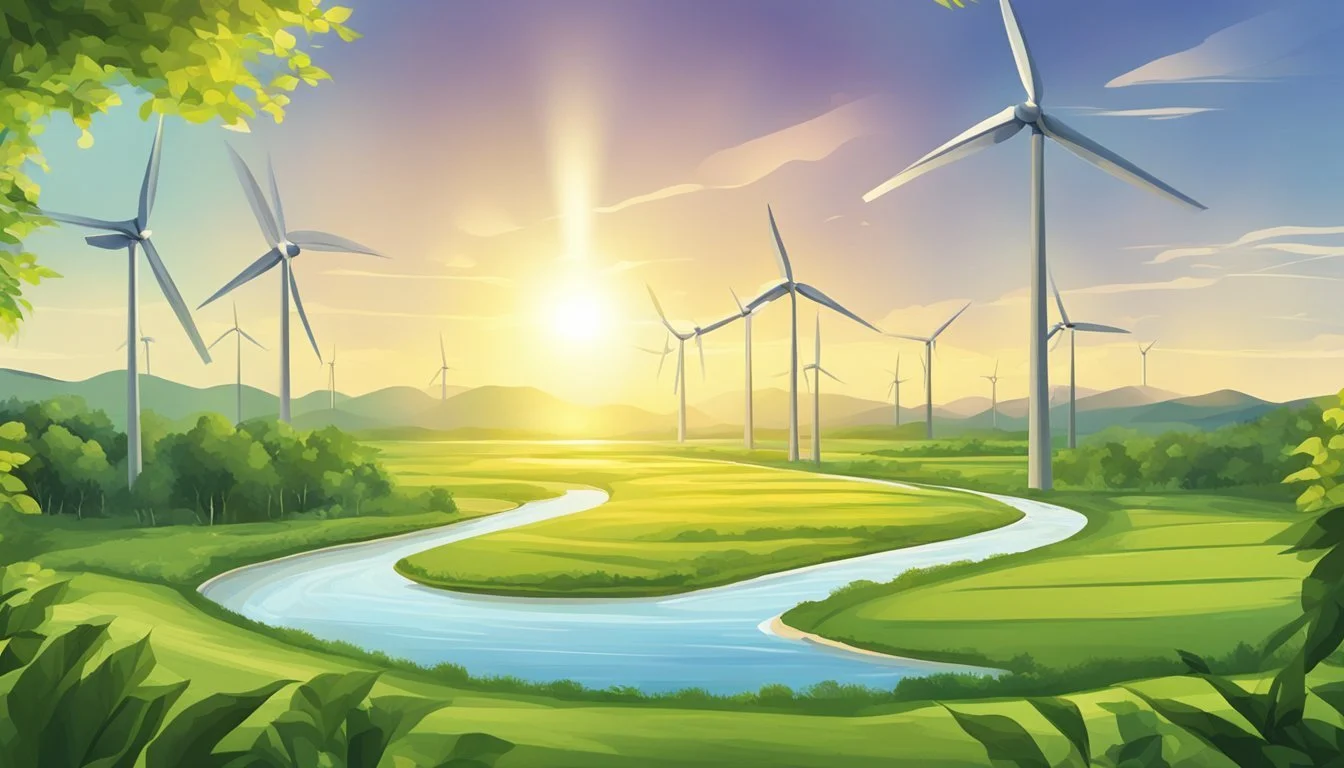Incentives for Renewable Energy and Conservation in Louisiana
A Comprehensive Guide
Louisiana recognizes the importance of shifting towards sustainable energy and has implemented a variety of incentives to encourage the adoption of renewable energy and conservation practices. These measures not only support the environment but also offer financial benefits to the residents. The state government, in collaboration with various energy programs, provides tax credits, rebates, and grants to individuals and businesses investing in renewable energy systems or making energy-efficient improvements to their properties.
Incentives like the Residential Energy Efficient Property Credit support homeowners in installing renewable energy equipment, including solar panels and wind turbines, by offering a 30% tax credit. This initiative illustrates Louisiana's commitment to reducing the reliance on fossil fuels and promoting sustainability. Similarly, the state's participation in federally funded programs such as the Weatherization Assistance Program (WAP) showcases efforts to improve energy efficiency in low-income households, contributing to lower energy bills and enhanced living conditions.
Moreover, the growth of renewable energy industries in Louisiana is propelled by the potential of natural resources like biomass and geothermal energy. This potential diversifies the state's energy portfolio and drives economic benefits, including job creation. Such diversity in energy sources is crucial for Louisiana's long-term economic and environmental sustainability, reinforcing the state's strategy to embrace renewable energy and conservation efforts.
Overview of Louisiana's Energy Landscape
Louisiana's energy landscape is shaped by its substantial natural resources and a growing focus on renewable energy. It stands at a crossroads with a historic reliance on fossil fuels and the burgeoning potential of renewable sources.
Natural Resources and Energy Production
Louisiana is abundant in natural gas and oil, situating it as a key energy producer in the United States. The state is reputed for its oil refineries and the production of petrochemicals. Louisiana's role in the energy sector is further highlighted by its extensive network of pipelines and storage facilities, supporting both local and national energy needs.
Renewable Energy Potential in Louisiana
Solar and wind energy present considerable opportunities for Louisiana. The state's geographic location offers significant sunlight, making solar power a viable option. While wind energy has not been widely adopted, Louisiana's coastal regions have the potential to host offshore wind farms, which could further diversify the state's energy portfolio.
Current State of Renewables
Renewable energy in Louisiana, particularly biomass, has seen incremental growth. Initiatives like the Weatherization Assistance Program (WAP) have weatherized 1,473 homes, leading to improved energy efficiency. Solar incentives have also encouraged uptake, with programs aiming to help residents with solar panel installation costs.
Challenges and Opportunities
The key challenge for Louisiana lies in balancing its historical ties to fossil fuels with the transition to renewable energy sources. There are significant opportunities for growth, especially with new legislation such as the Inflation Reduction Act, which could stimulate clean energy advancements in the state. Louisiana's energy future hinges on leveraging its natural resources while embracing the economic and environmental benefits of renewables.
State Policies and Incentives for Renewable Energy
Louisiana offers a range of policies and incentives to promote the adoption of renewable energy. These include financial mechanisms and regulatory standards to encourage investment and development in the state's renewable energy sector.
Renewable Portfolio Standard
Louisiana does not currently have a Renewable Portfolio Standard (RPS). However, discussions among state policymakers and stakeholders continue as they assess the potential benefits and impacts of implementing an RPS to increase renewable energy production.
State Energy Program
Under the State Energy Program (SEP), Louisiana receives funding and technical assistance from the federal government. The state administers these resources through the Louisiana Department of Natural Resources to support energy conservation, promote energy efficiency, and encourage the use of renewable energy sources.
Investment Tax Credit (ITC)
Louisiana provides an Investment Tax Credit (ITC) for solar energy systems, allowing both residential and commercial customers to reduce the upfront cost of solar installations. Taxpayers can claim a percentage of the cost of eligible solar energy systems installed on their property, thereby lowering the overall investment burden and shortening the payback period for their renewable energy projects.
Programs Promoting Energy Conservation
Louisiana offers several programs aimed at promoting energy conservation among its citizens. These programs provide various forms of financial support to encourage investments in energy efficiency, particularly for residential energy users and low-income households.
Residential Energy Programs
The state of Louisiana facilitates Residential Energy Programs that encourage homeowners to implement energy-efficient practices. Tax credits and rebates are offered to residents who upgrade their homes with energy-saving appliances and systems. This incentivizes individuals to consider not just the immediate cost but also the long-term savings associated with lower utility bills.
Weatherization Assistance Program (WAP)
Weatherization Assistance Program (WAP) is a federally funded initiative administered by the Louisiana Housing Corporation. It aims to assist low-income families by making their homes more energy-efficient. This includes adding insulation, sealing drafts, and other modifications that reduce energy consumption and lower heating and cooling costs without imposing a financial burden on the homeowners.
Energy-Efficient Investments
For those looking to make Energy-Efficient Investments, Louisiana offers helpful resources and guidance. Investment in energy-conserving home upgrades can lead to significant cost savings over time. Homeowners can consult with the Louisiana Housing Corporation for information on available programs and financial incentives to support these investments, ensuring that energy efficiency is both attainable and affordable.
Financial Incentives and Support
In Louisiana, the deployment of renewable energy and conservation measures is materially supported by financial incentives. These include tax credits and rebates, the positive economic impact of renewable investments, and utility-scale incentives, each contributing to a more sustainable energy future.
Tax Credits and Rebates
Louisiana offers a range of tax credits and rebates to encourage the adoption of renewable energy technologies and energy efficiency measures. The Investment Tax Credit (ITC) stands out as a significant policy, allowing both commercial and residential consumers to deduct a portion of their renewable energy system's cost from their taxes. Such incentives directly affect prices, making solar panels, wind turbines, and other renewable technology investments more affordable. For specific figures and eligibility requirements, residents and businesses should refer to the U.S. Energy Information Administration.
Economic Benefits of Renewable Investments
Investments in renewable energy technologies are not just good for the environment; they also spur economic growth by creating jobs. The installation, maintenance, and ongoing development of renewable energy infrastructure requires skilled labor, which in turn can foster the growth of new industries within Louisiana. The financial incentives available help make these investments more attractive to both individuals and companies, building up expertise and employment in this sector.
Utility-Scale Incentives
On a larger scale, utilities play a crucial role in the expansion of renewable energy. In Louisiana, companies like Entergy offer programs and incentives for large-scale renewable projects. These incentives not only support large renewable energy investments but also help to stabilize and potentially lower energy costs for consumers. Utility incentives therefore not only advance Louisiana's renewable energy capacity but can also have positive effects on the state's energy prices long-term. Entergy’s specific programs can be found through their official resources.
Renewable Energy Projects in Louisiana
Louisiana is actively enhancing its energy portfolio by embracing various renewable sources including wind, solar, and biomass projects.
Onshore and Offshore Wind
Onshore wind developments in Louisiana are modest, partly due to the state's geographical characteristics that offer limited wind resources. However, interest in offshore wind energy is growing, due in part to the existing expertise and infrastructure from the offshore oil and gas industry.
Solar Energy Initiatives
Louisiana has witnessed a surge in solar energy projects. For instance, a cluster of big solar farms have been proposed, with completion aimed for 2024. These projects are expected to significantly increase the state's solar capacity, contributing to renewable electricity generation and sustainability goals.
Biomass and Alternative Fuels
The state harnesses its agricultural capabilities to spearhead biomass and alternative fuels initiatives. A notable project includes a facility expected to produce renewable diesel, sustainable aviation fuel, and green hydrogen, exemplifying Louisiana’s commitment to innovative energy solutions with a net-negative carbon footprint.
Environmental Impact and Sustainability
Louisiana's landscape, with its rich natural resources and unique ecosystem, faces environmental challenges which renewable energy and conservation measures aim to mitigate. These initiatives are vital in reducing negative impacts and fostering a sustainable future for the state.
Reducing Greenhouse Gas Emissions
Initiatives in Louisiana are targeted at reducing greenhouse gas emissions, predominantly from fossil fuels such as coal, oil, and natural gas. By incentivizing renewable energy, the state aims to decrease its carbon footprint and combat climate change. For instance, solar and wind energy projects replace less sustainable sources, thereby lessening the release of CO2 into the atmosphere.
Carbon Capture and Sequestration
Carbon capture and sequestration (CCS) is a technological approach that Louisiana is exploring to further mitigate the environmental impact. CCS involves capturing carbon dioxide emissions from sources like power plants and then storing them underground to prevent them from entering the atmosphere. This technology compliments renewable energy efforts, acting as a bridge while renewable infrastructure expands.
Impact on Air Quality and Pollution
Improving air quality and reducing pollution are direct benefits of shifting to renewable energy and implementing conservation practices. Reducing reliance on fossil fuels lessens the emission of harmful pollutants, such as nitrogen oxides and sulfur dioxide, which can lead to smog and acid rain. As a result, Louisiana is working on both state and local levels to incentivize energy practices that contribute to a cleaner environment.
Advancements in Renewable Technologies
Renewable energy innovations in Louisiana signal a brighter, sustainable future, leveraging advanced technologies to transition away from fossil fuels. These advancements are creating a foundation for a green economy, securing both environmental and economic benefits.
Innovation in Renewable Sources
Renewable sources such as solar and wind power are being enhanced by innovative technologies. For instance, solar power generation has seen significant efficiency improvements, allowing for greater electricity generation even on smaller scales. Companies are utilizing high-efficiency photovoltaic cells and exploring new materials beyond silicon to push the boundaries of solar technology.
Developing a Green Economy
Louisiana's move toward renewable energy sources is not only achieving environmental goals but also driving economic growth. For every megawatt-hour of renewable energy produced, job opportunities emerge, ranging from manufacturing to installation and maintenance roles. The reduction in dependency on imported fossil fuels contributes to a more robust and resilient local economy.
Advanced Energy Technologies
Beyond solar and wind, Louisiana is witnessing advancements in bioenergy and geothermal technologies. These sources harness organic waste and the earth's heat, reducing waste and providing a stable energy supply. Further, the state's investment in research and development nurtures innovation in energy storage, such as cutting-edge battery systems, crucial for managing the intermittency of renewable sources.
Information and Resources for Residents
Residents of Louisiana have access to various resources and programs to support renewable energy and conservation efforts. These initiatives help reduce utility costs and promote sustainable energy practices.
Louisiana Public Service Commission
The Louisiana Public Service Commission (LPSC) oversees regulations that benefit residents by ensuring reliable utility services at fair rates. It develops policies that encourage energy efficiency and renewable energy sources. Residents can leverage the resources on the LPSC website to better understand their rights and the incentives available for energy conservation.
DSIRE Database
A crucial resource for Louisiana residents is the Database of State Incentives for Renewables & Efficiency® (DSIRE), which is a comprehensive source of information on the various government and utility incentives for renewable energy. Here, consumers can find detailed, up-to-date information on tax credits, rebates, and other financial incentives available in Louisiana.
EnergySage and Local Programs
EnergySage operates an online platform where Louisianans can obtain quotes for solar installations and compare potential savings. Additionally, local programs might be available, offering rebates or incentives for energy-efficient appliances, home energy audits, and renewable energy installations. Residents can explore these options to potentially reduce energy costs and contribute to a more sustainable energy profile for the state.
Conclusion
Louisiana's energy landscape is poised for a transformation. By 2050, the state aims to have a more diversified energy portfolio, inclusive of clean energy solutions. It recognizes the growing need for sustainable energy sources and is taking commendable steps to embrace renewable energy and energy efficiency.
The Louisiana Department of Energy is at the forefront of this change, advocating for policies that support the adoption of green technologies. Reinstatement of tax incentives can stimulate both residential and commercial sectors to invest in renewable energy systems. Encouragingly, these moves not only have the potential to lower energy bills but also to create jobs and foster a healthier environment.
Studies by the National Renewable Energy Laboratory (NREL) highlight Louisiana's potential to generate significant energy from renewable biomass and wind power. The state's abundant agricultural and forestry industries are assets in achieving its sustainable energy targets.
As the state continues its journey towards a clean energy future, it is essential that the established goals are pursued with consistent policy support and community engagement. This transition is not just about technological advancement but also about building a resilient energy system that can withstand future challenges while providing equitable access to all Louisianans.











